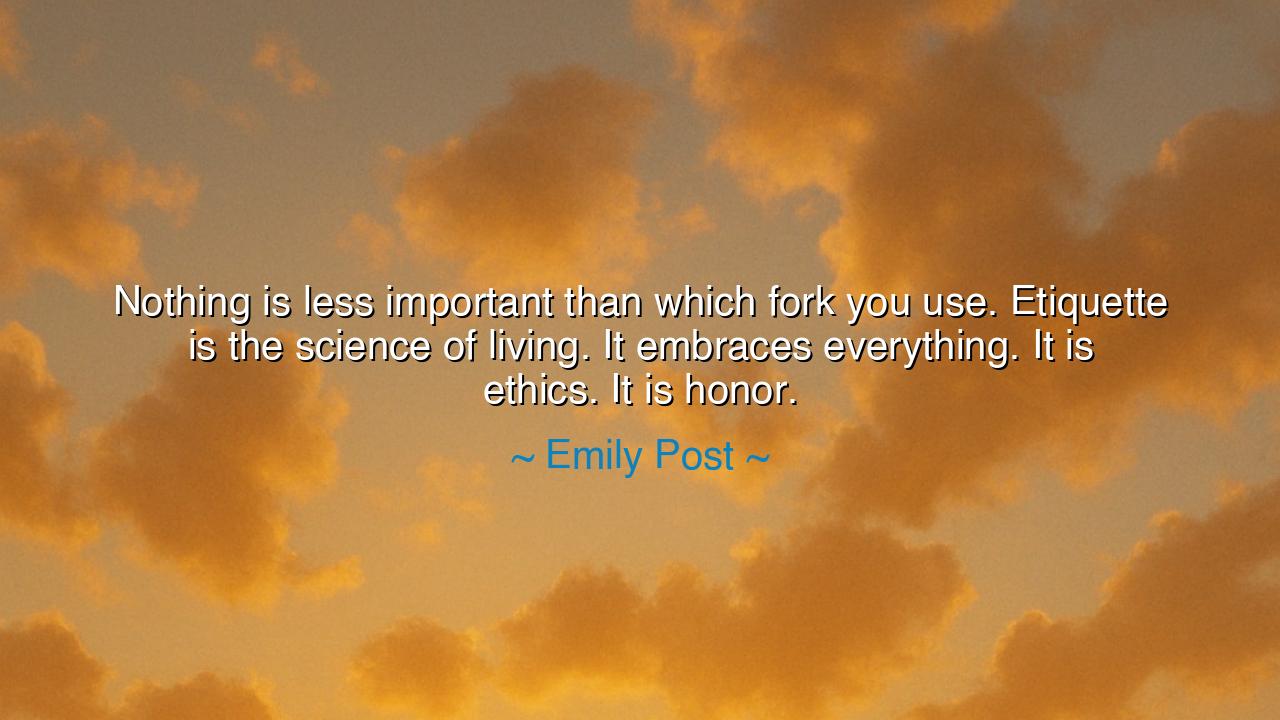
Nothing is less important than which fork you use. Etiquette is
Nothing is less important than which fork you use. Etiquette is the science of living. It embraces everything. It is ethics. It is honor.






"Nothing is less important than which fork you use. Etiquette is the science of living. It embraces everything. It is ethics. It is honor." These words, spoken by the esteemed Emily Post, speak to a truth that transcends the superficiality of social rituals and pierces the deeper layers of human interaction. Post, through her wisdom, reminds us that etiquette is not merely a collection of rules about dining or behavior—it is the very science of living. At its core, etiquette is about more than which fork to use; it is about the way we relate to others, the honor with which we treat them, and the respect we show in every aspect of our lives. It is the foundation of ethical living, a way of interacting with the world that speaks to the highest virtues of humanity.
In the ancient world, the philosophers taught that honor and ethics were the cornerstones of a well-lived life. The great Socrates often spoke of the importance of virtue and how it must permeate every part of life—not just the grand actions, but the smallest of interactions. For Socrates, to live a life of honor was to live in accordance with the truth, treating others with respect and pursuing knowledge with a sense of moral responsibility. Plato, his student, would later expand on these ideas, teaching that the highest form of justice was the harmonious living of all parts of life, from the public sphere to the private. Similarly, Post’s conception of etiquette echoes this ancient wisdom: that how we conduct ourselves in every moment—whether in the simplest acts of socializing or the most formal of settings—reflects our ethics and honor.
Consider the noble knights of the medieval world, whose code of chivalry required not only great feats of bravery but also a deep respect for others, especially women and the weak. The knights were expected to embody the virtues of honor, respect, and courtesy, not only on the battlefield but in their daily lives. This code was not limited to how they wielded their swords but also to how they sat at the table, how they spoke, and how they treated every individual they encountered. In the same way, etiquette, as Post suggests, is not merely about outward appearances but is a reflection of our inner character—our moral fiber. To live with honor means to carry oneself in a manner that reflects both one’s internal values and the respect one shows to the larger world.
In modern society, etiquette often comes across as something trivial or outdated—a set of guidelines for fine dining or formal gatherings. Yet, Post’s insight challenges this perception. She reminds us that the essence of etiquette is not found in superficial gestures but in how we embody respect and honor in every moment. When we choose to treat others with kindness, when we listen attentively, when we are mindful of our words and actions, we practice etiquette in its highest form. It is not about the proper positioning of silverware; it is about creating an environment in which everyone feels valued and respected, regardless of their station.
One of the most enduring examples of etiquette serving as a guiding force for honor and integrity can be found in the life of Mahatma Gandhi, whose actions were guided by the principles of truth, respect, and non-violence. Gandhi believed in the power of personal conduct to effect change in society. He taught that true honor is found in how we treat one another, how we uphold our personal integrity, and how we act in accordance with our values. His concept of Satyagraha—nonviolent resistance—was not just a political stance but a way of living, a form of etiquette that embraced honor in the face of adversity. For Gandhi, the way we interact with others in our daily lives holds the power to change the world.
Post’s quote also reminds us of the importance of small actions in the grand scheme of life. In the ancient traditions, it was often the smallest acts of courtesy and consideration that revealed the true character of an individual. Confucius, the great philosopher of ancient China, emphasized the importance of proper behavior in every aspect of life, from the smallest gesture to the most important decisions. For Confucius, etiquette was not about following a rigid set of rules but about cultivating a life of virtue, one where each action, no matter how seemingly insignificant, was guided by the principles of respect and honor. In this way, we see that etiquette is the practical application of our deepest ethical beliefs.
The lesson here is timeless: etiquette is not a superficial display, but a manifestation of honor, ethics, and respect in action. It is the way we show up in the world—not just in grand moments, but in the mundane, everyday exchanges. By embracing etiquette as a science of living, we cultivate a life of integrity, honor, and respect, weaving these virtues into the fabric of our interactions with others. Every moment, every gesture, every word, can reflect the depth of our character, and in this, we create a world where ethics and honor reign. Let us strive to embody the highest principles of etiquette, not as empty formality, but as the living manifestation of our values. In doing so, we not only enrich our own lives but inspire the same respect and dignity in the lives of those around us.






AAdministratorAdministrator
Welcome, honored guests. Please leave a comment, we will respond soon